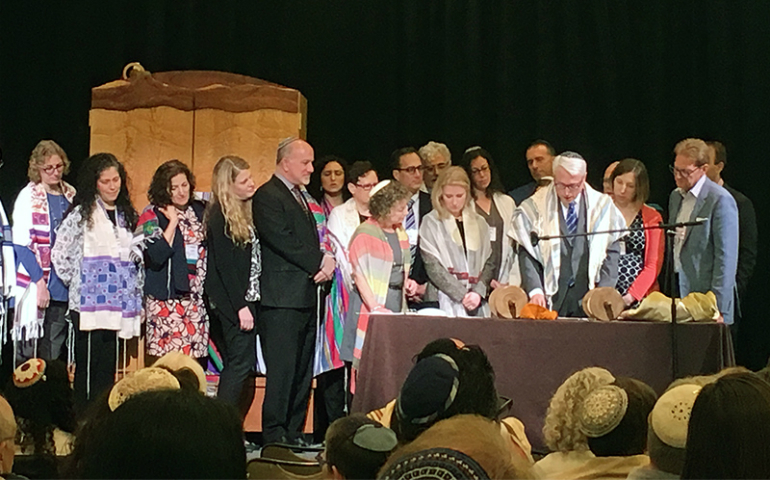
A Torah scroll is read during the annual convention of the Central Conference of American Rabbis in Atlanta on March 20, 2017. (CCAR)
The rabbi feels she is running on a hamster wheel, a wheel built by President Donald Trump.
In the weeks since his inauguration, Trump has given progressive-minded rabbis much to resist and counter, and it’s exhausting, said Andrea London, who with more than 500 other rabbis is attending the annual convention of the Central Conference of American Rabbis in Atlanta, which ends March 22.
“We focus on anti-Semitism. We focus on Islamophobia. We focus on the travel ban. And what about health care? It’s the feeling that Trump is throwing so much stuff at us,” said London, who leads Beth Emet, The Free Synagogue — a congregation near Chicago.
“He’s got us all on our hamster wheels. It doesn’t always feel like we’re being terribly productive even though we’re incredibly busy.”
CCAR, the rabbinic group of the largest stream of Judaism in North America — designed a conference to help London and other rabbis in the progressive-minded Reform movement better manage their growing workload.
Among the issues that confront them:
Anti-Semitic incidents have been rising in the U.S. in the past few years, and many Jews and others fault the Trump administration for only belatedly calling out anti-Semitism, and for failing to explicitly denounce those who have heralded his election as a victory for white people.
And Jewish and Muslim groups have banded together in unprecedented ways in recent months as mosques and Jewish institutions have been targeted.
Such interfaith solidarity and social action is a particular focus of CCAR this year.
“An Ethics of Social Justice and Repair: Values and Strategies” is one session on the four-day schedule where rabbis will be taught the activist skills many of them seek to hone. The rabbis can also attend “Prayer and Spiritual Resistance,” and “Living Out a Racial Justice Campaign in Your Community.”
Rabbi Mona Alfi said she is looking forward to co-facilitating a Wednesday session on how a congregation can establish itself as a sanctuary for undocumented immigrants, something her own synagogue, B’nai Israel in Sacramento, Calif., has done.
For Alfi, the rise in crimes against Jews and Muslims is one both groups better confront together.
“What my community is concerned with is not just the uptick in anti-Semitism but the uptick in xenophobia and the ostracizing of particular groups,” she said. “Now is the time to strengthen the bonds between different faith groups and different ethnic groups. That is the strength of our country.”
The conference this year is especially heavy with nationally known speakers who can offer perspective on the current events preoccupying the rabbis and their congregants, said Rabbi Steven Fox, CCAR’s chief executive.
Dana Bash, CNN’s chief political correspondent, opened the conference Sunday and NAACP President Cornell William Brooks will also address the group, along with Southern Poverty Law Center President Richard Cohen.
But Fox also knows that the increased demands on rabbis in the current political climate also necessitates more time for them to take a break to think, pray, and talk at the conference — in both formal sessions and informal gatherings.
And that is why Monday’s program included a session called “The Inner Experience of Being A Rabbi in Turbulent Times,” which was led by CCAR’s special adviser on wellness.
“We want to provide spiritual sustenance to our rabbis so that they in turn can provide spiritual leadership and sustenance to their communities,” said Fox.
And then they will delve back into difficult topics, such as Israel and its relationship to the Palestinians, which also gets significant billing on CCAR’s four-day agenda, including a session called: “Creating a Culture of Dialogue on Israel.”
The politics of the Jewish state and the U.S.-Israeli relations divides some Jewish communities, with many in the Reform movement taking a critical view of what they consider Netanyahu’s wavering commitment to a future state for Palestinians.
Rabbis want to learn more, Fox said, about leading civil and productive conversations on Israel in their congregations.
Not all Reform rabbis at CCAR are satisfied with the tenor of the conversation at CCAR.
One, a pulpit rabbi from a Southern state who finds great fault with Trump, said it still isn’t wise for CCAR to appear — however unofficially — as an anti-Trump association, even if the great majority of its rabbis feel the administration is doing great harm.
Though a quarter of Jews (24 percent) voted for Trump — a lower percentage than any other religious group — that still leaves a considerable minority of Jews who did. Most Jewish Trump voters tend to affiliate with Orthodox and other more traditional streams of Judaism, but some belong to Reform congregations.
There are people in our pews who are Trump supporters, and we need to remember that, said the rabbi, who asked not to be named to avoid straining relationships with colleagues.
“It’s problematic because it follows the perception that Reform Judaism is the Democratic Party with holidays,” the rabbi said.



